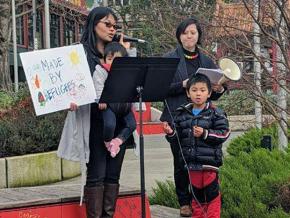Anti-immigrant fanatics go after new victims
reports on another Trump administration anti-immigrant campaign — and the protests that it’s sparking in Southeast Asian communities across the U.S.
THE LARGEST groups of immigrants in the U.S. facing deportation hail from Latin America, Africa and the Arab world, but as an equal opportunity bigot, Donald Trump is ramping up a deportation campaign against Southeast Asians. Some 8,000 Vietnamese refugees may soon be at risk of deportation.
The U.S. government was already using a number of pressure tactics to force Cambodia to accept deportees from the U.S. after a 2002 agreement fell apart in 2017.
Now the Trump administration is seeking to renegotiate a 2008 agreement between Vietnam and the Bush administration that exempted many Vietnamese refugees from deportation, so long as they arrived in the U.S. before the two countries reestablished diplomatic relations on July 12, 1995.
Advocates for Vietnamese immigrants are linking up with other immigrant rights activists across the U.S. to call out this travesty.

On January 11, 150 people rallied in Hing Hay Park in Seattle’s international district to denounce Trump’s attack. The crowd chanted “Honor the agreement” and “What do we want? Justice! When do we want it? Now!” before marching to the Little Saigon district to show solidarity with Vietnamese in the U.S.
Rally participants were greeted by Native American activists who welcomed them to the lands of the Duwamish and Suquamish, the original Native tribes in the Seattle area. They said that Natives welcomed all people to the area, and that no one had consulted them on immigration policy.
Other speakers pointed out the devastating effects of deportations, not just on individuals, but also on families, whole communities and the economy generally. One man facing deportation was adopted as a toddler by an American family, but some of the adoption paperwork was lost. The U.S. government does not consider him a citizen though he knows no other country and is now in his 40s.
This attack flows from Trump’s racist and anti-immigrant worldview, but it also contradicts decades of previous U.S. foreign policy. In the past, the U.S. government has typically favored refugees from countries it considered enemies and rewarded those who contributed to U.S. war efforts in their home countries.
For example, it gave special treatment to people fleeing Castro’s Cuba, Chávez’s Venezuela and Vietnam. The message was clear: if you help the U.S., the U.S. will help you in the event of “problems” in your home country. And the U.S. government figured that refugees from “enemy” countries would tend to serve as a right-wing bulwark against left-wing opposition in the U.S.
THE CAMPAIGN around Vietnamese refugees was especially intense. In the aftermath of the U.S. war on Vietnam, pro-war campaigners argued that the new government was repressive and forced its opponents into “re-education camps.”
The “boat people” were accepted into the U.S. in large numbers as part of the effort to justify the war and maintain sanctions against the new Vietnamese government that had humiliated the world’s most powerful military.
As the Huffington Post reported:
Ted Osius, the former U.S. ambassador to Vietnam, revealed in an April issue of Foreign Service Journal that he was instructed to pressure the Vietnamese government to repatriate more than 8,000 people — most of whom were refugees who had “fled South Vietnam on boats and through the jungle” after the Vietnam War. Osius said that the Trump administration’s repatriation efforts ultimately resulted in his departure from his diplomatic post last year.
“The majority targeted for deportation — sometimes for minor infractions — were war refugees who had sided with the United States, whose loyalty was to the flag of a nation that no longer exists,” Osius wrote. “And they were to be ‘returned’ decades later to a nation ruled by a communist regime with which they had never reconciled. I feared many would become human rights cases, and our government would be culpable.”
After Vietnam opened its economy and made peace with the global economic system over the next few decades, it was seen as less threatening to U.S. interests. The U.S. government renewed diplomatic relations, resulting in the 2008 immigration agreement.
In addition to Trump’s bigotry, a few other factors have contributed to the proposed shift in immigration policy. One, the government of Vietnam, though still formally “Communist,” is largely integrated into the system of global capitalist markets, so there is less of a political premium or an economic reason for protecting its citizens.
Two, refugees from Vietnam have grown older and have had children and grandchildren. Decades after their arrival, they’ve experienced racism, income inequality and all the other problems that plague working people in the U.S. As a result, this population is not as uniformly right wing as it once was.
Three, the political climate in the U.S. ruling class has shifted more in an anti-immigrant direction. Even Ronald Reagan — in 1986 — promoted an immigration plan that actually granted amnesty to some undocumented immigrants. In recent years, neither party has been willing to pass “comprehensive immigration reform,” which itself is more anti-immigrant than Reagan’s limited immigration reforms.
The Vietnamese community and immigrant rights advocates are mobilizing against this attack. If the 2008 agreement is abrogated, more than 8,000 people would be subject to deportation. And though the agreement mainly affects immigrants who arrived prior to July 12, 1995, the termination or weakening of the agreement would also affect some later immigrants, meaning that many more than 8,000 might be affected.
The campaign against this change in immigration policy will continue and will keep on linking up with the immigrant rights movement generally.


